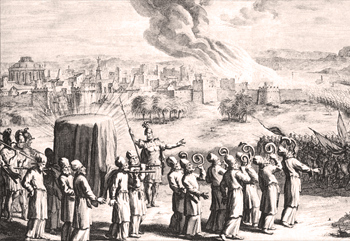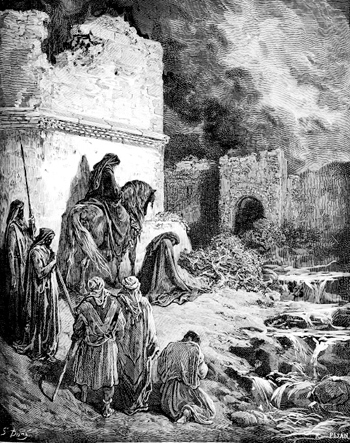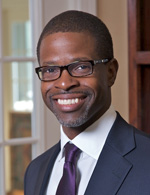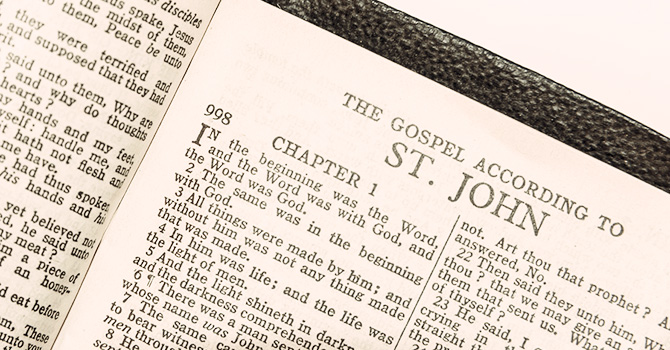1 Samuel 3:1-11 ; John 20:11-18
Editor's note: Faith & Leadership offers sermons that shed light on issues of Christian leadership. This sermon was preached May 10, 2010, at commencement exercises for graduates of Western Theological Seminary in Holland, Mich. The service was held in Dimnent Memorial Chapel on the campus of Hope College.
I've never done one of these commencement addresses before, so I asked around on how to do it. A colleague said when she did one, she found the genre swept her up. She couldn't not speak in platitudes. "Go forth and change the world," she preached, wincing as the clichés poured out. Fellow graduates of my college reminded me that Davidson did away with commencement speakers sometime in the 1800s after a particularly long-winded oration -- I will try not to become part of Western's illustrious history that way.
You can tell I got a lot of advice on what not to do. And the best advice I got was this: Don't not preach the gospel. I'm a guest in a Reformed house today -- if the word is not preached, John Calvin would ask us, why should we bother calling it "church" at all? So just to make sure we don't fall into that easy trap of not preaching the gospel, let's turn to the text from St. John, with apologies to the biblical and theology faculty here who know this text so much better than I do.
Mary has come to the garden not looking for a risen savior but for a dead friend and failed messiah. And she discovers that, in a last gratuitous insult, the killers of her Lord have also stolen his body. Mary is past desolation, so much so that when the very one she grieves appears to her, she mistakes him for the gardener. There's an immediate lesson here for all you graduating pastors, amidst the ocean of grief you will swim in at times in your parishes. The hope you will have to offer those who grieve is the resurrected Lord, precisely when those in grief are not expecting him.
We can push farther here and say a bit more theologically about this passage. Do you hear an echo here of another time when God walked in a garden? I know you do -- you had professors Stubbs and Billings. Our first parents wept as they were exiled from the garden. Jesus appears here to weeping Mary to replace her tears with joy. Jesus is the second Adam, whose work reverses the failure of the first.
Mary doesn't recognize Jesus until he says her name. She rushes to embrace him, and very strangely, he tells her not to. "Do not hold on to me," he says. "I am ascending to my Father and your Father, to my God and your God." Strange isn't it? Precisely when things get strange in Scripture we should look for the Spirit, stirring the waters.
That short sentence from Jesus is the entire logic of the gospel. Jesus takes his way of addressing God, as Father, and grants that Mary and you and I can call God "Father" too. And he can do this because he stooped among us to call his Father what mere creatures call him: "God." St. Cyril of Alexandria put it this way: "In his case the Heavenly One is his natural Father; in our case he is our God. But insofar as this true and natural Son became as we are, so he speaks of the Father as his God, a language fitting to his self-emptying. Still, he gave his very own Father even to us." And I can't leave out my friend St. Augustine here: "This is the wonderful exchange, the divine business deal, the transaction effected in this world by the heavenly dealer. He came to receive insults and give honors, he came to drain the cup of suffering and give salvation, he came to undergo death and give life." In the gospel a magnificent trade happens. Jesus takes all our God-abandonment, our sin, our distance from God, and in return gives us his divine favor, sonship, blessing and love. That's a good deal.
The church is the gospel re-enacted. It's the gospel made flesh. What happens between Mary and Jesus happens between Jesus and you and me every time we show up Sunday. Jesus says our name, "Mary." We respond the way Mary does when she realizes the gardener is actually the resurrected Lord: "Teacher, Rabbi!" We don't hold on to him, but we go and tell others, "I have seen the Lord." The church over two thousand years and every continent is the others whom Mary and friends told. You all joined up with that going and telling in your baptism, and now as pastors you will equip others to go and tell. It is a good and honorable profession you enter, as partners with Jesus, Mary, Augustine and Cyril, Calvin and lots of people with Dutch surnames I can't pronounce, your seminary professors and former pastors, and your friends and family here. Go from this place with them and tell.
But not yet. First I have to do my due diligence and talk about the Old Testament passage, or Professor Bechtel will be right to object. Samuel describes a bleak day in Israel. "Visions were not widespread." As if to reinforce the point, the judge and priest Eli is said to be nearly blind. Of course Israel cannot see God -- her priestly leader can't see anything! His own two sons are using their positions of privilege to enrich and satisfy and fatten themselves, so God is going to judge this temple in Shiloh and this family and all Israel because of them. Eli's family later comes apart. His sons die in battle, he falls over and breaks his neck, his daughter-in-law dies in childbirth and gives birth to Ichabod, which means, "Where'd the glory go?"
You've heard a sermon or two on this, I'm sure -- about how corrupt religious institutions can become. We Protestants like to use passages like this to criticize our Jewish or Catholic forebears; more evangelical churches like to use them to judge those in the mainline. Notice the enemy is always someone else outside ourselves. But these sermons have a point. Human beings do have a tendency to use positions of power to benefit themselves and their families as they forget about the people they're called to serve. Good thing Samuel is young and able to hear God's voice, precisely when old Eli is nearly deaf. Samuel will grow up and be well-known as a trustworthy prophet of the Lord; "none of his words [fell] to the ground," the text says.
I have to warn you, new ministers: your churches will treat you as Samuel. They will see your youth, your fresh presence out of seminary, and they will say, "Save us." You will be expected to help stanch 30 years of mainline decline. They'll ask you to bring in new people, to relate to the youth, to tell the church how not to ossify and how instead to spring into new life. As my Duke colleague Nathan Kirkpatrick says, the church "fetishizes" its young ministers. We ask our young ministers to be our messiahs. As if the church has any other messiah than Jesus.
Here's one more problem with how we usually read this story: Samuel is not above reproach, even as a young man living in the temple since infancy. Verse 7 says: "Samuel did not yet know the Lord, and the word of the Lord had not yet been revealed to him." A young minister who does not know. And Eli, for all his corruption, knows what to say and do in the house of the Lord. Now Eli's a little slow -- God has to call Samuel three times before Eli remembers that God does sometimes do this sort of thing. But he is a custodian of the ancient and treasured words, "Tell the Lord, 'Speak, for your servant is listening.'" And when Samuel tells Eli of the judgment coming against his house, Eli knows how to respond: "It is the Lord; let him do what seems good to him."
Samuel and Eli offer together two visions for ministry, both incomplete without the other. Youth without direction, wisdom or knowledge; old age without sight or hearing. My Duke colleague Steve Chapman is who I'm cribbing in this section. T.S. Eliot said immature poets imitate; mature poets steal. Chapman told a crowd like this one: "Keep before you Samuel and Eli as twin emblems for your developing sense of pastoral identity: spirituality and professionalism, receptivity and expertise, religious authenticity and the tradition. And then in your congregations the word of God will be heard often -- and as for visions, well … there will be visions galore."
These two passages together speak of the twinned good news of the gospel. The good news is not just that Jesus died and rose, though he did, hallelujah. It's that Jesus presents himself to us again and again in his church. As we grow in love with Jesus we don't just love him, the bridegroom; we also love his bride. The church is the Word made flesh anew, if I can put it so boldly. And as a pastor you get the staggering privilege of ministering to this body wherever you go in the world.
I've been out of seminary more than a decade now. I've had time to watch which of my classmates have stayed in ministry and thrived, and which have either gotten out or wish they could. It's not that those who've stayed in are holier or better than the others -- we religious professionals are often far less holy than the people we serve. Just ask Eli. The pastors I've watched who have hung in there have something of Eli and something of Samuel in them. They're people whose lives depend on institutions like the temple, and who cultivate holy friendships, like that between Mary and Jesus. And they practice at being surprised by Jesus. Those are my three points for the last part of this sermon: institutions, friendships and surprise.
First, institutions -- ours is an age that is not fond of institutions, to put it mildly. I say the very word and you probably immediately think of the DMV, customer service at the cell phone company, or worse, the classis. The most influential theories on religion say that they start out with a charismatic figure, like Jesus, and then they fizzle down and harden into an institution, like my Methodists, with buildings and budgets and bishops. At least since the 1960s we've had a sense in this country that institutions are not to be trusted -- just like people over 30 and Duke basketball fans.
But I've come to think this common view of institutions is dangerously one-sided -- like championing Samuel alone and having no good word for Eli. Andrew Sullivan, the Catholic blogger and provocateur, says it this way: "Institutions are the most humane thing there are." Think about it. It's hard to accomplish much of anything without an institution, from getting born to getting educated to getting married to getting buried. The church gave the world such institutions as the hospital, the university, hospice and Habitat. And more importantly for us, I doubt any of us has heard the gospel without an institution: a camp, a youth group, a campus ministry, a church. John Calvin knew the good of institutions when he named his greatest work. We speak well when we call Jesus' words at the Last Supper the "words of institution."
No one knew this power of institutions like ancient Israel. They were chosen as a people. They built a temple and lived by God's laws and fought enemies and sought their promised land together. And as sturdily as they built their places of worship, they always remembered these were nothing without the Spirit of God blowing through them. With that Spirit they see visions like Isaiah's and Ezekiel's, and they are priests to the world. What people in the ancient world told stories about themselves like these from Samuel? Most peoples in history tell stories about their triumphs -- just ask your fellow Americans. Augustine wrote "Confessions" to say he's far more sinful than any of his gossiping enemies realized. Israel taught him that. Israel tells stories about her failure and about her great God. Just so, she's a God-breathed institution.
And people who thrive in ministry are institutional people. Not that they refuse to see the harm institutions do -- Lord knows we need no more of that. Nor that they're people who want to scramble to the top and run institutions and tell other people what to do -- again, Lord spare us. But they're people who humbly recognize that the goods in our lives are institutionally gestated, nurtured and born. It's more than the fact that together we're more than the sum of our parts. It's that together we are the body of Christ, bathed in Mary's womb and fed on the flesh and blood of her son.
Think of institutions this way: Jean Vanier founded L'Arche in France to be a place where mentally disabled people and able-bodied people could live together in community and peace. He took people from institutions in the awful sense -- asylums and places of abandonment -- and brought them to institutions in the gospel sense -- places where each can pursue her or his God-given gifts to the fullest. I love this little RCA institution, Western Theological Seminary, on the banks of Lake Michigan, partly because you've institutionalized Vanier's gift with your Friendship House. Seminary students live with disabled people and learn about gentleness and community. It's not the DMV. It's the gospel.
Many of my former seminary classmates left the ministry after they tried to fix things at warp speed. They tried to make the whole church pacifist. Or inerrantist. Or as inclusive as they are in their enlightened, tolerant state. All in a year or two. They wrote some articles, served a church or two, went to some conferences, and it just didn't work. So they became Latin-Mass Catholics, for whom most recent popes are dangerous liberals with too compromising a posture vis-à-vis the modern world. Or they became bicycling, farmers-market-shopping crusaders against carbon-based fuels. Now they look at people like us and are puzzled: "Why are you still messing around with church and those same old pitiful problems?" In their impatience they fail to see that God chooses to save corporately, through institutions. It should be no surprise to anyone who's even glanced at the Bible or church history that institutions are often corrupt. And at the same time, institutions are the most beautiful things we have.
People who thrive in ministry are part Samuel, part Eli. They're also part Mary -- the first preacher of the gospel. I love that Mary has come to grieve and anoint and bless her dead friend. Mary goes out of her way to attend to her friend bodily. Of course she recognizes him when he says her name -- that's what friends do: they say each other's names with tenderness. The greatest gift of ministry I know is holy friendships among co-laborers for the gospel. People whose very lives are also physically shaped by giving themselves over to the church. To meet one after time away is like seeing the face of Moses shining on his way down Mt. Sinai. It's like Mary hearing her own name and being staggered to learn that resurrectional friendship undoes the grave.
Friends, you have to go out of your way for such friendships -- as Mary does here with Jesus. Meet people once a year for retreat. Schedule time for phone calls. Notice when your friend's face has fallen and go ask what's eating at them. Facebook is good but not enough. Love one another actively and with your hands and feet. Some of my best friends now are people I was in seminary with but not that close to back then. Living the same sort of pastoral life, thousands of miles away from one another, has made us close. We need the church as an institution, as I've preached here. We also need intimate friendships with those who know us by name and treasure us.
Mary shows us something else about fruitful ministry. She's surprised by the resurrected Lord. That's a capacity that faithful and happy and successful ministers have: they're constantly surprised by the risen Lord. Now this is a hard trick -- to be surprised by something you're expecting is not easy. Just try to scare or tickle yourself -- it doesn't work. Mary is surprised by Jesus even though she saw him feed 5,000, heal the multitude and respond to his murderers with forgiveness. She is so not looking for him she almost misses him. Good thing she put her body in the right place -- she couldn't miss him even though she wasn't looking for him. We have to do the same -- to put ourselves where we can't miss Jesus. In the church. In the pages of the Scriptures. Among God's people. Among those who don't believe. Among our enemies and the marginalized. And everywhere we go, if we look hard, we will be surprised again by Jesus. Test me on this -- I promise you -- Jesus never runs out of his ability to surprise.
The church is the resurrection institutionalized. It's a canopy, a space, a temple in which life-sustaining friendships can grow and we can become holy, saints. Ya'll go forth from this place to stand in the garden with Mary on the holiest ground in history -- the place where the risen Lord appears to women and men as ordinary as us, mediates grace to us through institutions, makes a space for us where we can love one another as friends, and constantly surprises us anew with the risen Christ. What a privilege and joy this work is. Welcome to it.
Amen.



















